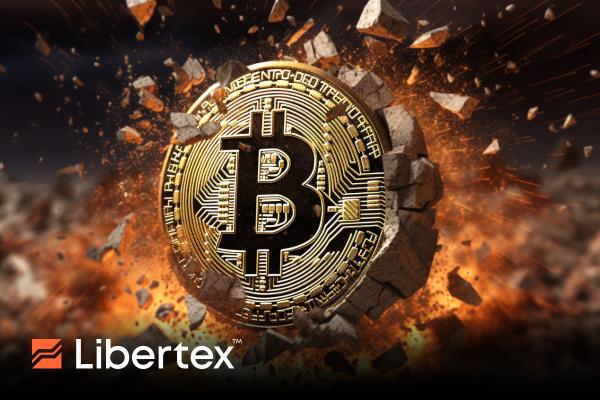It's been said at every major leg up over the past decade or more that Bitcoin is overpriced, and there's no way such levels can be sustained. The most recent furore came in December 2024 after the original cryptocurrency broke $100,000, and yet here we are, a little over half a year later, with BTC rising above $120,000 for the first time. Bitcoin shot up 3% on 14 July to record an all-time high of $123,153.22 before settling to $118,183.90 on 17 July, which equates to more than 25% YTD gains. Whether or not the spike above $120,000 was little more than the result of a $1 billion futures-market-driven short squeeze is of little import as BTC now sets its sights on the next major milestone of $150,000.
At a time when uncertainty remains high on the global capital markets, Bitcoin has seemingly managed to maintain investors' interest and keep its name in the headlines. With the Senate now awaiting a vote on three major digital assets bills, the CLARITY Act, the CBDC-banning Anti-CBDC Surveillance Act, and the stablecoin-regulating GENIUS Act, House Republican leaders have dubbed this "Crypto Week". This strengthening of the regulatory framework, coupled with increasing adoption among institutions and corporations, is surely a positive driver of future growth. We'll be examining these, along with several other macroeconomic and environmental factors, to try and plot BTC's trajectory over the rest of the year and beyond.
Bitcoin is for life, not just for Christmas
An undeniable positive for the wider crypto market, but for Bitcoin in particular, is the multi-faceted and accelerating adoption that we're seeing across a wide and growing base of institutions, including not only investment funds and insurance companies but even traditional corporations. A total of 125 publicly traded companies now hold some kind of BTC reserves on their balance sheets. This is up from 79 in Q1 2025 and represents a massive 58.23% increase in the space of just three months. Collectively, these companies now own 847,000 BTC, which is equal to more than 4% of the total Bitcoin supply. With an average price of $107,754 over this past quarter, the total value of these holdings now stands at over $90 billion, up more than 60% quarter over quarter.
These figures serve to demonstrate just how much wealth has been created over a short time, and the trend shows no sign of slowing. Indeed, data from Santiment and SoSoValue reveal that spot Bitcoin ETFs alone have pulled in $7.78 billion in inflows since 9 July, averaging $353.8 million daily over that time. While this obviously aids liquidity and supports price growth, Peter Schiff has warned that the rapid rate at which large companies are purchasing BTC could risk igniting a huge speculative bubble, going as far as to say: "This is a Ponzi built on a pyramid. It's not about broadening Bitcoin adoption. It's about wild centralised speculation that undermines Bitcoin's foundational principles." His stark warning, which was echoed by economist Steve Hanke, is exactly that: it's not to say that Bitcoin is not a viable investment over the longer term, just that investors should proceed with caution in periods of rapid growth while institutions should treat BTC more like gold than a speculative pump-and-dump asset.
Regulation, regulation, regulation
After a seemingly unending period in which the cryptocurrency legislation was hazy at best and non-existent at worst, the US looks set to finally achieve a comprehensive digital assets regulatory framework, and one written by perhaps the most pro-crypto administration in history to boot. The approval by the SEC of the spot Bitcoin ETFs early this year was a major step forward, and now, the CLARITY Act, the Anti-CBDC Surveillance Act, and the stablecoin-regulating GENIUS Act have been passed by the US Senate. These bills will define digital assets clearly by type, establish which bodies are responsible for regulating which type, and bring in key protections like self-custody rights and mandatory delisting of unsafe tokens.
Crucially for institutions, it also introduces anti-money-laundering and KYC procedures. These provisions will provide real protection to existing holders of crypto and make BTC more accessible through traditional investment vehicles offered by institutions like banks and state pension funds. This should not only boost adoption, it should also aid price stability and combat the risk of a bubble since these kinds of funds typically hold assets for very long periods of time. Despite the release of this week's CPI and PPI data showing overall consumer prices up 0.3% in June (almost 3.5% annually) and Trump's fresh raft of tariffs due 1 August, there doesn't appear to have been significant risk-off among investors. It is important to note that this could be a result of pricing-in or an expectation that the Fed will cut rates anyway and Trump will agree to a deal before the deadline. If either of these events fails to occur, we could see a knee-jerk reversal.
Trade Bitcoin and more CFDs with Libertex
With Libertex, you can trade a wide variety of CFDs across multiple asset classes. Libertex's crypto offering includes legacy digital assets like CFDs on Bitcoin and Ethereum, as well as the Grayscale Bitcoin Trust and a wide selection of spot Bitcoin ETFs. For more information or to create an account of your own today, visit www.libertex.org/signup.






